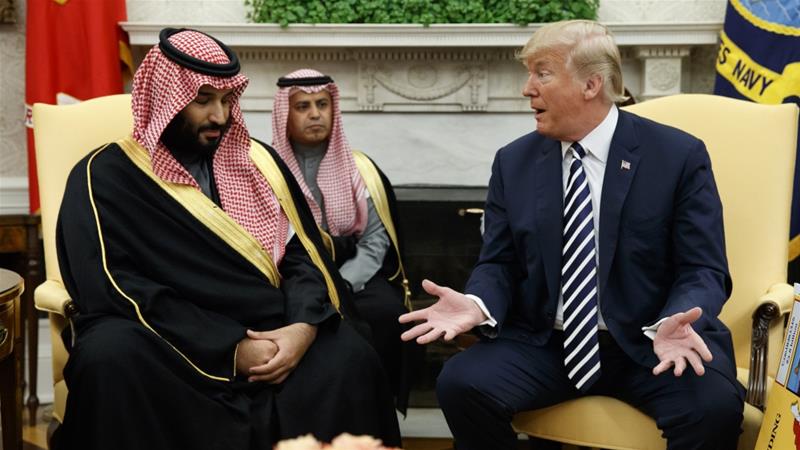BY: Joe Macaron
Yemen is not Saudi Arabia’s only unfinished war in this decade. Before Crown Prince Mohammed bin Salman’s military intervention in Yemen, the former Saudi intelligence chief Prince Bandar bin Sultan spearheaded, between 2012 and 2014, a clandestine proxy war against Iran in Syria. Now, US President Donald Trump is offering Riyadh a comeback to compensate for the potential withdrawal of US forces from Syria.
White House National Security Adviser John Bolton and nominated Secretary of State Mike Pompeo are reportedly leading talks aimed to build an Arab coalition to serve as a stabilising force after the defeat of the Islamic State of Iraq and the Levant (ISIL, also known as ISIS) in northeast Syria. The countries involved in the discussions are Egypt, Bahrain, Jordan, Qatar, Saudi Arabia and the United Arab Emirates. The US is offering Riyadh – at the centre of these efforts – a major non-NATO ally status if it comes through with peacekeeping forces and funding.
Here’s why this proposal, if ever implemented, will make no difference and will most probably aggravate the situation in Syria.
White house calculations and Arab disunity
The White House did not engage the Saudi offer earlier this month to take part in the air attacks against the Syrian regime on April 14. Yet, last December, Trump asked Saudi Arabia to provide $4bn to rebuild Syria (an offer Riyadh dismissed), while simultaneously expecting that the Kingdom tolerates the US decision to recognise Jerusalem as Israel’s capital. There is a belief in Riyadh that Trump is asking for Saudi cover on Israeli-Palestinian issues without giving back anything in return. And what Saudi Arabia currently wants from the US is its commitment to deter Iran’s growing influence in the Middle East.
Just this month, Trump complained about OPEC’s attempts to raise the oil price, which is crucial for Saudi Arabia’s grand economic plans, while asking Riyadh to relieve the US of its burden in Syria. Down the road, US-Saudi relations might not remain as cozy as they currently appear.
Riyadh has entertained sending troops to Syria numerous times since 2011, but former President Barack Obama’s administration was wary about Saudi intentions and ability to undertake this mission. These challenges remain the same today, if not more acute. On the regional level, this presumed Arab coalition, if deployed, will have no clear mandate.
Both the Arab League and the Gulf Cooperation Council (GCC) are currently dysfunctional, while the 34-nation coalition to counter ISIL that Riyadh announced in December 2015 seems to be more of a public relations stunt than an actual force on the ground.
Previous Arab peacekeeping efforts are not to emulate. For example, the Arab Deterrent Forces, during the Lebanese civil war in 1976, were a total disaster and a cover for the Syrian regime occupation.
Moreover, the actors involved in this proposal do not share the same goals. The US is focused on defeating ISIL and stabilising northeast Syria, while it is not clear if some of the Arab partners will use this platform to pressure the Syrian regime and/or deter Iran.
Having Emirati and Qatari troops on the ground in Syria without resolving the GCC crisis is a recipe for mission malfunction. The Yemeni model shows how even Saudis and Emiratis can have contradictory objectives; the attempted coup in Aden last January is just one example.
Egypt will most likely not send troops in order not to jeopardise its minimal relations with Damascus. It makes no sense for Amman to send military forces all the way to the north while it has long made clear that no Jordanian soldiers will enter Syria on its immediate border in the south.
Other ideas that are being floated include outsourcing the job to either the ill-reputed US military contractor Blackwater or regional private fighters, which means double-dip outsourcing: the US relegate the job to Saudi Arabia which in turn consigns it to mercenaries who are willing to do the dirty job.
What about Turkey, Russia and the SDF?
Most importantly, discussing this matter with Arab partners alone is a futile exercise. US presence in Syria is a non-transferable license without the licensor’s consent. Washington needs to have discussions with the Syrian Democratic Forces (SDF), the main force on the ground in the northeast. If there is also no tacit understanding with Turkey and Russia, the Arab coalition will go into a landmine field and the US will need to be constantly involved to protect these troops, if not babysit them. The main allies of the Arab coalition, Jordan and Israel, are on the southern border and they have no geographical link to them.
This presumed Arab coalition will be operating in a hostile environment, surrounded by the Syrian regime, Iran, Russia, the SDF and Turkey. Most of the Arab partners involved in the discussions have difficult relations with Turkey, the most crucial neighbour in the northeast. Saudi Arabia will have to convince the Syrian opposition to deal with the SDF as the Kurdish forces will not give up their positions without a fight or a deal.
Riyadh will also need to strike its own deal with Kurdish groups before going in, otherwise the potential for confrontation is high and Saudi troops’ record in fighting wars is abysmal. The Arab coalition will face the same dilemma as US forces currently do regarding how to balance the relations between Turkey and the SDF. Moreover, the looming question is who will provide the guarantees that the Arab coalition will not be targeted or will not renew arming rebels after going in.
Trump seems focused on the business transaction of getting US troops out of Syria with no clear regional strategy. The offhandedness in approaching this Arab coalition plan gives an impression that his advisors are buying time to delay the president’s insistence on a full withdrawal from Syria.
If all that Saudi Arabia will get out of this deal is a major non-NATO ally status, that’s a “bad deal”, to use Trump’s vocabulary. Jordan acquired this status in 1996 and it has no value except a symbolic one, as Washington already guarantees the security of Gulf countries.
While the US might secure an early withdrawal with this plan, the Arab coalition might in the long run drag the US deeper in the Syrian war. This offer to replace US forces and the Saudi expectation that the US should stay instead are mined invitations exchanged between two allies, both reluctant to face off with Iran and both having no clue what to do next.
Courtesy Aljazeera



